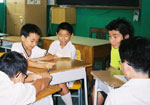Thanks
to Partners |

Federation
volunteers help 88th LCI
HKFYG's
VNET (Youth Volunteer Network) helped recruit and train 326
young volunteers for the 88th LCI Convention
which took place in Hong Kong between 20 June and 3 July. The
Federation was invited by the Lions Club International
District 303 to take part. The volunteers gave a warm welcome to more
than 10,000 Lions Club members who came from over 100 countries
and regions. Their services included acting as local tour guides,
providing backup support and helping the organizers with logistical
arrangements to ensure the event ran smoothly. Visit www.hkfyg.org.hk/yvn/photo/88lions/ for
more information. If you are interested in using volunteers
to help with a forthcoming event. contact Jacqueline at VNET
tel 2169 0032.
|
 |
Teen
Action 2005
We are
very happy to announce the successful completion of 'Teen
Action 2005', organized by the Federation and the
Hong Kong Police Castle Peak Police Station. Teenagers
aged between 13 and 16 who have been cautioned by the police
took part in the 2-month
programme. Every Saturday, policemen volunteered to lead them
for fitness training. This year, the programme received generous
sponsorship from Mr Lam Tak-leung, Chariman of the Tuen Mun
District Fight Crime Committee and as a result, a new
2-day field training camp was introduced. Mr Cheung Koon-wah,
Divisional Commander, arranged for 11 policemen and 2 expert
volunteers
to accompany
the teenagers
at the camp on hiking expeditions, night-time exploration,
command tasks and field cooking. All of the teenagers agreed
that it was a wonderful experience and said they had improved
communication skills, physical fitness and developed good team
spirit. We'd like to give our sincere thanks to everyone involved.
|
 |
|
Young
volunteers help Jockey Club visitors
Invited
by the Hong
Kong Jockey Club, the
Federation's VNET helped to train twenty-two volunteers
aged 18 and above to assist staff with elderly and mentally
or physically disabled visitors at the Shatin Race Course.
The volunteers received a 2-day training session from the
Federation before going to the race course between
4 July and 19 August. They were also taught some magic
tricks with which to entertain the visitors during lunch
breaks. The volunteers were a great success with the people
they looked after. They deemed the experience most rewarding
and good for improving interpersonal skills with a very
diverse group. They helped by taking
care of their differing needs while also creating a
happy diversion
for them. Visit VNET's homepage at www.u21.org.hk/yvn if
you are interested in knowing more about how the volunteer
network works:
|
 |
Federation
and RTHK Radio 4 Concert
The
Federation will co-present the 'Music Zone Campus Concert' 樂觀主義校園音樂會with RTHK
Radio 4 on 11 September (Sunday) from 5pm – 6:30pm
at the International Christian Quality Music Secondary and
Primary School. The Federation's choir, The Hong Kong Melody
Makers, has been invited by RTHK to sing
the theme song of Music Zone written by Peco Chui. The audience
will also hear performances by the Junior Hong Kong Chinese
Orchestra dizi and sheng ensemble, the Hong Kong Youth Flute
Orchestra, YOT Tin Ka Ping Primary School and the harmonica
trio - The Figlistens- The concert is free of charge and
all young music lovers are welcome. For further information
please
contact RTHK Radio 4 at 2339 6425.
|
 |
|
|
 |
The
new school year begins
in September and there is an air of anxiety, particularly
amongst parents, for those young students who will be making
their way from primary to secondary school. Teachers and
pupils are also anxious about how the transition from primary
to secondary school will affect some students.
|

|
Not
only will the new students have to contend with new schools,
new class mates, subjects, time tables and teachers, they will
also have to learn how to manage their time more effectively
in order to keep up academically. The Federation is here to help.Not
every student can stand these pressures. Youthline 2777 8899 held
a press briefing this week, where Federation staff discussed
adjustment counselling, teachers spoke about school support programmes
and students shared their own experiences of preparing for the
transition. The Federation's Youthline 2777 8899 is there for
anyone who needs help. All students are encouraged to call and
speak to someone who can help.
To see Youthline's
hot tips, visit www.u.21.org.hk
Contact Ms. Nancy Poon Man-ying on telephone 2395 0161 for more information about
the Federation's counselling services.

Federation
News
2005
Grand Raffle Campaign
The Federation Grand Raffle Campaign 2005 is underway till 29 September
Date of draw: 30 September 2005.
Tickets at HK$10 each. Click here
to download a ticket order form.
Fax us the completed form at 2123 9565 or email to partnership@hkfyg.org.hk.
Sound
of Music Charity Marathon 27-28 August
Over 150 young people participated in The Sound of Music Charity Marathon on
27 and 28 August, enjoying the fun of performing a vocal and/or instrumental
rendition of a song from the musical. Sincere thanks to all participants and
generous donors.
Youth
Business Hong Kong selection process underway
The Federation's newly launched "Youth Business Hong Kong (YBHK)" programme
has attracted 91 applications and the first batch of 10 successful business
start-ups will receive appropriate seed funds and expert mentorship services.
For further details, contact Louisa Lau, tel 3113 7999 email ybhk@hkfyg.org.hk or
visit www.u21.org.hk/ybhk
|
|
Feature
Story
Help for anxious
students
It is time for the new school term to start and the Federation's social workers
are ready to help with back-to-school problems. When pupils fresh from primary
arrive to start their first term at secondary school it is a crucial time. Parents
and teachers alike are of course aware of the possibility of problems but sometimes
students turn to the school social workers.
We talked to several of them and they told us how important it
is for them all to work together, identifying students in need
early and nipping their problems in the bud. There are worries
about getting to know new teachers, handling new learning methods
and new subjects. Moving to secondary school means coping with
an entirely new environment. It may be just another of life's great
challenges for some but for others the difficulties can be overwhelming.
|


|
"Awareness
that problems exist is much greater than it was even five years
ago," said Constance, "Teachers, parents
and the students themselves are now far more likely to notice
something wrong and seek our help to deal with it."
"It
isn't always easy to find the ones with the biggest problems," she
continued. "they often want to hide, especially by
the time the problem has become serious. Then they tend to
reject help from any authority figure they don’t trust. If
we can build up trust early on it really works."
"The
teachers help us," said
Stanley. "Students keep diaries for them as part of
their school work and problems become evident that way. It
is sometimes easier to write about how you feel than to talk
about it. Once they admit the problem to themselves they realize
that they can find a non-judgmental ear in their school social
worker. That's when they will seek our attention and start
talking."
Constance told us how experience has
shown her the need for patience and understanding, being able to
sit and listen and then make a professional assessment. This is
the essence of the initial approach that the Federation's School
Social Work unit now likes to use, giving students the time and
space to externalize their doubts and fears, relax and be themselves.
"We let
them know that we care, that we are really concerned for their
well-being,
that we won't take sides and will always be there for them.
If we sit down with them early enough we really can help," said
Stanley. "I think it is easier for us than for some parents
who sometimes simply cannot imagine what is wrong, even if their
children try to explain. They aren't taken seriously and the
pattern of mutual trust begins to break down. If we are vigilant,
with the teachers' help, we can step in at the right time."
"We remind them of their
strengths, build up confidence and show them how to re-interpret
experiences that seem negative to
a young
impressionable mind in a positive way. Every individual has something
special if they can only see it."
The school
social workers know that preventive methods can work if they
come into play early enough. The transition from primary to secondary
school is critical. Young people's future academic success and
self-image often depends on how they feel about themselves and
how well they cope with such a major change in their lives.
"We are writing a handbook
for teachers and colleagues, showing them step-by-step how to
monitor, diagnose and help students who
are dismayed or depressed. Until the book is ready we are planning
a training scheme for students to help those within their peer-group.
It means that when there are not enough social workers to go round
they can be 'joyful ambassadors', seeing their friends and classmates
through the blues and onwards into a fulfilling, absorbing life
at school."
|
 |
Facts & Figures
Gender ratios:
balance in education improving on the Mainland
Almost all
of the news about the balance of numbers between genders has
been pessimistic of late but there are signs that girls are
catching up, if slowly, in one important way. The number of them
in higher education on the Mainland has gone up by more than 10%
since 2005.* 6.09 million or 45.7% of the total doing undergraduate
studies were women in 2004
|

|
but
the figures slump for postgraduate degrees with only 31.4% female
Ph.D students. The figures are better balanced in secondary vocational
schools where women outnumber men at 51.5%.
These statistics
are interesting to compare with general demographic figures.
The global average is
103 to 107** girls for every 100 boys whereas the 2001 mainland
census statistics show a serious imbalance of 100 girls to 120
boys. Unofficial reports for certain provinces including Guangdong
were even more alarming at 100:130. At the 2005 National People's
Congress plenary session the National Population and Family Planning
Commission warned that there would be 30-40 million young men
without wives by 2020, bringing worries about a surge in crime
rates and
social instability.
In Hong Kong, there are 5.8% fewer girls than boys up to the age
of 19 but then the situation reverses. There are 8.2% fewer men
aged 20-29 than there are women. The difference becomes really
marked in the 30-44 year old age group where there are over 227,000***,
or approximately 21% fewer men than women. Good news for mobile
chaps on the Mainland who prefer mature partners.
*South China Morning Post 27 August E3**The Standard 25 August
2005 A9
*** China Daily 2 August 2005 P9
****http://www.info.gov.hk/censtatd/eng/hkstat/fas/pop/by_age_sex_index.html
|
Keep
your feet flat on the ground
A recent report* stated that 34% of a sample group of Hong Kong
school children had flat feet. The group of 576 came from 6 primary
and secondary schools in the city and the year-long study was conducted
by a private specialist centre. More than 50% of the children found
to have flat feet were less than 8 years old and the centre recommends
close monitoring and early treatment.
|

|
However, advice from the British Orthopaedic
Foot Surgery Society and the American Academy of Family Physicians
should make parents hesitate before taking their children in for
treatment. Both organizations say that in the majority of cases
no treatment is required.
"It used to be thought that flat feet in children should
be treated with special shoes, insoles or callipers to stop problems
developing
in later life. We now know that this was wrong. These treatments
do not work: children treated in this way end up the same as similar
children who are not treated, and the child often refuses to wear
the shoes, insoles or callipers. There is no evidence that treating
flat feet in childhood prevents problems in adult life and most of
these children will not get problems as adults even if left untreated." British
Orthopaedic Foot Surgery Society
Well fitting shoes without high heels are highly recommended for
all age groups. Good sense rather than following fashion will prevent
foot trouble later in life.
* South China Morning Post 23 August 2005 C4
**http://www.bofss.org.uk/html/flat_feet.shtml http://familydoctor.org/106.xml
|

|
|

